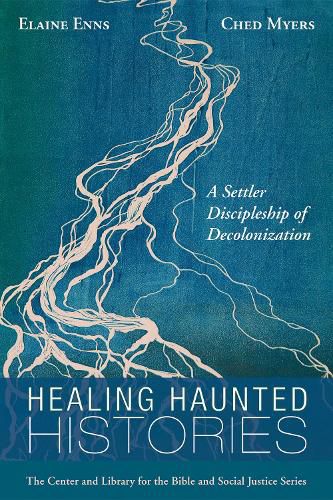Readings Newsletter
Become a Readings Member to make your shopping experience even easier.
Sign in or sign up for free!
You’re not far away from qualifying for FREE standard shipping within Australia
You’ve qualified for FREE standard shipping within Australia
The cart is loading…






This title is printed to order. This book may have been self-published. If so, we cannot guarantee the quality of the content. In the main most books will have gone through the editing process however some may not. We therefore suggest that you be aware of this before ordering this book. If in doubt check either the author or publisher’s details as we are unable to accept any returns unless they are faulty. Please contact us if you have any questions.
Healing Haunted Histories tackles the oldest and deepest injustices on the North American continent. Violations which inhabit every intersection of settler and Indigenous worlds, past and present. Wounds inextricably woven into the fabric of our personal and political lives. And it argues we can heal those wounds through the inward and outward journey of decolonization.
The authors write as, and for, settlers on this journey, exploring the places, peoples, and spirits that have formed (and deformed) us. They look at issues of Indigenous justice and settler response-ability through the lens of Elaine’s Mennonite family narrative, tracing Landlines, Bloodlines, and Songlines like a braided river. From Ukrainian steppes to Canadian prairies to California chaparral, they examine her forebearers’ immigrant travails and trauma, settler unknowing and complicity, and traditions of resilience and conscience. And they invite readers to do the same.
Part memoir, part social, historical, and theological analysis, and part practical workbook, this process invites settler Christians (and other people of faith) into a discipleship of decolonization. How are our histories, landscapes, and communities haunted by continuing Indigenous dispossession? How do we transform our colonizing self-perceptions, lifeways, and structures? And how might we practice restorative solidarity with Indigenous communities today?
$9.00 standard shipping within Australia
FREE standard shipping within Australia for orders over $100.00
Express & International shipping calculated at checkout
This title is printed to order. This book may have been self-published. If so, we cannot guarantee the quality of the content. In the main most books will have gone through the editing process however some may not. We therefore suggest that you be aware of this before ordering this book. If in doubt check either the author or publisher’s details as we are unable to accept any returns unless they are faulty. Please contact us if you have any questions.
Healing Haunted Histories tackles the oldest and deepest injustices on the North American continent. Violations which inhabit every intersection of settler and Indigenous worlds, past and present. Wounds inextricably woven into the fabric of our personal and political lives. And it argues we can heal those wounds through the inward and outward journey of decolonization.
The authors write as, and for, settlers on this journey, exploring the places, peoples, and spirits that have formed (and deformed) us. They look at issues of Indigenous justice and settler response-ability through the lens of Elaine’s Mennonite family narrative, tracing Landlines, Bloodlines, and Songlines like a braided river. From Ukrainian steppes to Canadian prairies to California chaparral, they examine her forebearers’ immigrant travails and trauma, settler unknowing and complicity, and traditions of resilience and conscience. And they invite readers to do the same.
Part memoir, part social, historical, and theological analysis, and part practical workbook, this process invites settler Christians (and other people of faith) into a discipleship of decolonization. How are our histories, landscapes, and communities haunted by continuing Indigenous dispossession? How do we transform our colonizing self-perceptions, lifeways, and structures? And how might we practice restorative solidarity with Indigenous communities today?